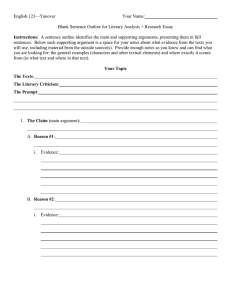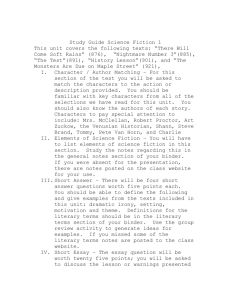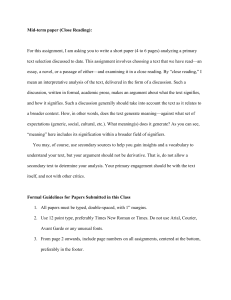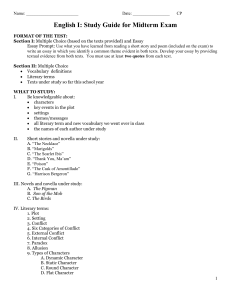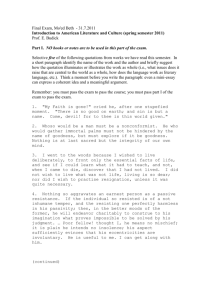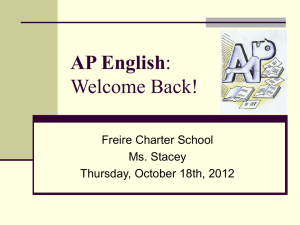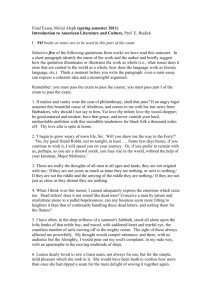WorldLitSpring2010.doc
advertisement
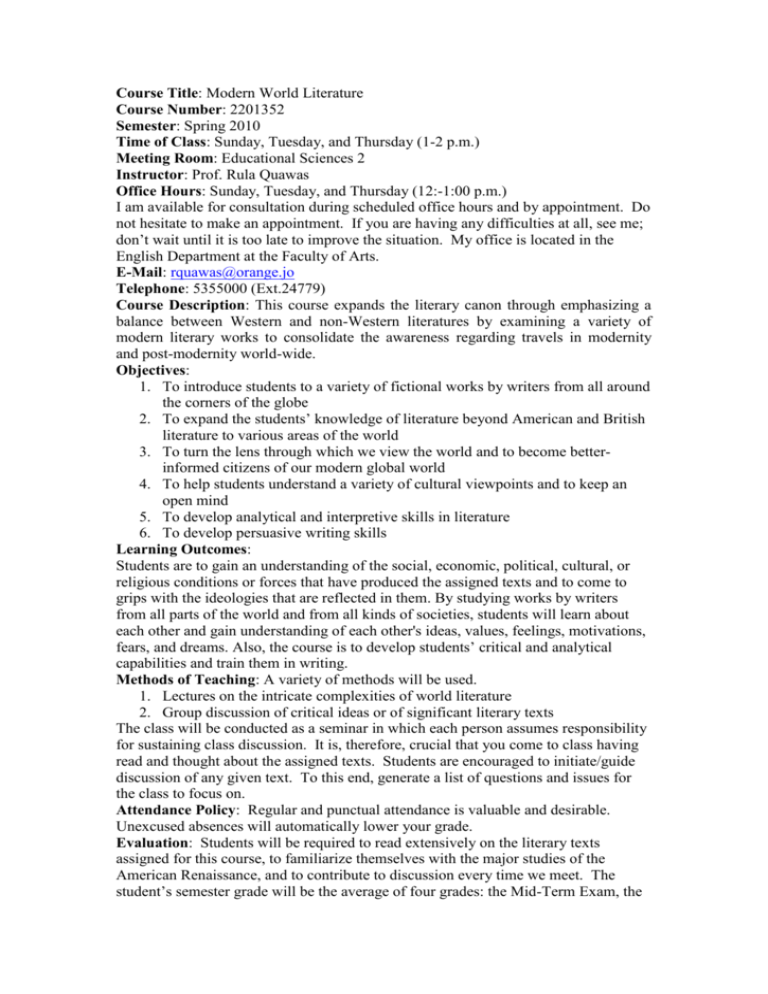
Course Title: Modern World Literature Course Number: 2201352 Semester: Spring 2010 Time of Class: Sunday, Tuesday, and Thursday (1-2 p.m.) Meeting Room: Educational Sciences 2 Instructor: Prof. Rula Quawas Office Hours: Sunday, Tuesday, and Thursday (12:-1:00 p.m.) I am available for consultation during scheduled office hours and by appointment. Do not hesitate to make an appointment. If you are having any difficulties at all, see me; don’t wait until it is too late to improve the situation. My office is located in the English Department at the Faculty of Arts. E-Mail: rquawas@orange.jo Telephone: 5355000 (Ext.24779) Course Description: This course expands the literary canon through emphasizing a balance between Western and non-Western literatures by examining a variety of modern literary works to consolidate the awareness regarding travels in modernity and post-modernity world-wide. Objectives: 1. To introduce students to a variety of fictional works by writers from all around the corners of the globe 2. To expand the students’ knowledge of literature beyond American and British literature to various areas of the world 3. To turn the lens through which we view the world and to become betterinformed citizens of our modern global world 4. To help students understand a variety of cultural viewpoints and to keep an open mind 5. To develop analytical and interpretive skills in literature 6. To develop persuasive writing skills Learning Outcomes: Students are to gain an understanding of the social, economic, political, cultural, or religious conditions or forces that have produced the assigned texts and to come to grips with the ideologies that are reflected in them. By studying works by writers from all parts of the world and from all kinds of societies, students will learn about each other and gain understanding of each other's ideas, values, feelings, motivations, fears, and dreams. Also, the course is to develop students’ critical and analytical capabilities and train them in writing. Methods of Teaching: A variety of methods will be used. 1. Lectures on the intricate complexities of world literature 2. Group discussion of critical ideas or of significant literary texts The class will be conducted as a seminar in which each person assumes responsibility for sustaining class discussion. It is, therefore, crucial that you come to class having read and thought about the assigned texts. Students are encouraged to initiate/guide discussion of any given text. To this end, generate a list of questions and issues for the class to focus on. Attendance Policy: Regular and punctual attendance is valuable and desirable. Unexcused absences will automatically lower your grade. Evaluation: Students will be required to read extensively on the literary texts assigned for this course, to familiarize themselves with the major studies of the American Renaissance, and to contribute to discussion every time we meet. The student’s semester grade will be the average of four grades: the Mid-Term Exam, the Final Examination, Assigned Projects, and class participation. 50% of the grade goes to the final Examination, and 50% for the mid-term exam, assigned projects, and class participation. The final exam will require essay-type responses. On essay questions, the student will be evaluated on clarity of argument, critical thinking, use of evidence, and stylistic presentation. At the beginning of the essay, state your thesis or argument in response to the question or topic, and then structure the essay clearly to establish your points. Use topic sentences to show where the essay is going and avoid overgeneralizations. Reading Assignments: All reading assignments must be completed by the beginning of the class period on which they have been assigned. It goes without saying that the student is encouraged to read as widely as possible in the field, over and beyond the assigned material. Study Plan: Week 1: Course Plan and Orientation Week 2: Course Introduction (Literature beyond; universality; what gets lost in translation) Week 3: Leo Tolstoy, “How Much Land Does a Man Need?” Week 4: Jean-Paul Sartre, “The Wall.” Week 5: Alan Paton, “A Drink in the Passage.” Week 6: Doris Lessing, “A Sunrise on the Veld.” Week 7: Chinua Achebe, “Marriage is a Private Affair.” Week 8: Grace A. Ogot, “The Rain Came.” Week 9: Fumiko Hayashi, “Downtown.” Week 10: R. K. Narayan, “Forty-Five a Month.” Week 11: Joao Guimaraes Rosa, “The Third Bank of the River.” Week 12: Gabriel Garcia Marquez, “A Very Old man with Enormous Wings.” Week 13: Shirley Jackson, “Come Dance with Me in Ireland.” Week 14: Alifa Rifaat, “Bahiyya’s Eyes.” Week 15: Movie Week Week 16: Wrapping Up
